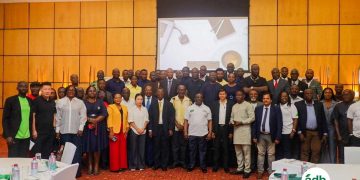Czech President Criticizes US Tariffs on African Nations During Ghana Visit
Czech President Petr Pavel has issued a strong condemnation of the United States’ recent imposition of sweeping tariffs on a range of African nations, including Ghana, calling the move “brutal” and “unfortunate.” His comments came during a joint press conference with former Ghanaian President John Dramani Mahama at Jubilee House, part of a three-day state visit aimed at strengthening bilateral ties between the Czech Republic and Ghana.
The tariffs, which range from 10% to 50%, have been levied on imports from numerous countries as part of a broader strategy by the US to protect its domestic industries. The policy has sparked widespread international criticism, particularly from those in the developing world, who argue that it risks destabilising fragile economies already grappling with the effects of the global economic downturn.
“I think imposing tariffs in such a brutal way really doesn’t help either side,” President Pavel remarked, underscoring the broader negative ramifications of the policy. “It will not help the situation in Africa, and it will not help the situation in Europe, Asia, and even the United States.”
Pavel’s remarks were particularly pointed in relation to the impact on some of the world’s poorest nations, such as Lesotho, Cambodia, and Laos, which now face some of the steepest tariffs in US history. “It could be easily destroying their economies,” he warned, highlighting the vulnerability of smaller economies that rely heavily on global trade.
The Czech president called for a multilateral approach to address the issue, advocating for a united diplomatic response to persuade Washington to reconsider its protectionist stance. “We have to collectively address the United States to rethink this approach and to negotiate… not destroying countries,” he said. “Damaging their economies so much would create a number of problems that will have to be dealt with later on that may prove much more costly.”
Former President Mahama echoed Pavel’s sentiments, stressing the importance of maintaining a rules-based global trading system. Mahama, who has recently returned to office following Ghana’s 2024 elections, warned that the US tariffs could have severe consequences for countries like Lesotho, where the garment industry plays a pivotal role in the economy.
“We all accepted a rule-based trading system, and it has served the world well,” Mahama said. “If you understand that one of the largest contributors to Lesotho’s economy is the trade and garments industry, then you can be sure that it’s going to affect a small country like Lesotho.”
The former Ghanaian president urged global leaders to move beyond narrow national interests and focus on collective progress. “We must look at the broader global partnerships and the global interests rather than just our parochial national interests,” he said.
Pavel’s visit underscores the growing international resistance to protectionist trade policies, with his remarks serving as a reminder of the challenges facing developing economies in a rapidly changing global landscape. The two leaders also discussed avenues for greater trade cooperation, technological collaboration, and joint initiatives in education and infrastructure during their talks.
As the US continues to face mounting criticism for its tariffs, calls for more equitable global economic frameworks are growing louder, particularly from countries in Africa and other emerging markets that feel the brunt of such unilateral policies.








